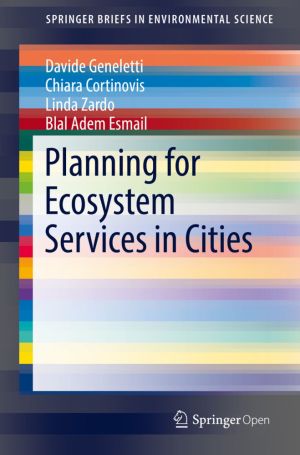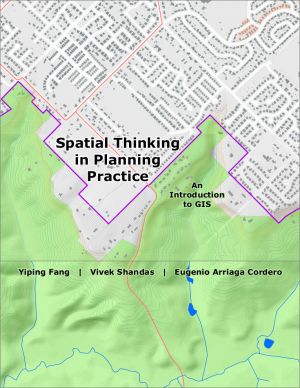Spatial Thinking in Planning Practice
An Introduction to GIS
by Yiping Fang, Vivek Shandas, Eugenio Arriaga
DescriptionTable of ContentsDetailsHashtagsReport an issue 






Book Description
The goals of this textbook are to help students acquire the technical skills of using software and managing a database, and develop research skills of collecting data, analyzing information and presenting results. We emphasize that the need to investigate the potential and practicality of GIS technologies in a typical planning setting and evaluate its possible applications. GIS may not be necessary (or useful) for every planning application, and we anticipate these readings to provide the necessary foundation for discerning its appropriate use. Therefore, this textbook attempts to facilitate spatial thinking focusing more on open-ended planning questions, which require judgment and exploration, while developing the analytical capacity for understanding a variety of local and regional planning challenges. While this textbook provides the background for understanding the concepts in GIS as applicable to urban and regional planning, it is best when accompanied by a hands-on tutorial, which will enable readers to develop an in-depth understanding of the specific planning applications of GIS. In the end of each chapter, we also provided several discussion questions, together with contextual applications through some web links.This open book is licensed under a Creative Commons License (CC BY-NC). You can download Spatial Thinking in Planning Practice ebook for free in PDF format (9.4 MB).
Table of Contents
Chapter 1
Defining a Geographic Information System
Chapter 2
Coordinate Systems and Projecting GIS Data
Chapter 3
Topology and Creating Data
Chapter 4
Mapping People with Census Data
Chapter 5
Lying with Maps
Chapter 6
To Standardize or Not to Standardize?
Chapter 7
Geographic Considerations in Planning Practice
Chapter 8
Manipulating GIS Data
Chapter 9
Raster Data Models
Chapter 10
The Future of GIS
Book Details
Title
Spatial Thinking in Planning Practice
Subject
Computer Science
Publisher
Self-publishing
Published
2014
Pages
61
Edition
1
Language
English
ISBN13 Digital
9781312778986
ISBN10 Digital
1312778989
PDF Size
9.4 MB
License

Related Books

This book presents current knowledge about ecosystem services (ES) in urban planning, and discusses various urban ES topics such as spatial distribution of urban ecosystems, population distribution, and physical infrastructure properties. The book addresses all these issues by: i) investigating to what extent ecosystem services are currently includ...

Despite the emphasis of the European Regional Policy on territorial cohesion, regional disparities have been increasing within Europe in the past years. The metropolitan areas in almost all countries are considerably growing while regions outside of agglomerations are stagnating or even declining. Against this background this book aims to provide a...

This book discusses the learning and teaching of geometry, with a special focus on kindergarten and primary education. It examines important new trends and developments in research and practice, and emphasizes theoretical, empirical and developmental issues. Further, it discusses various topics, including curriculum studies and implementation, spat...

This book comprises the Proceedings of the 12th International Congress on Mathematical Education (ICME-12), which was held at COEX in Seoul, Korea, from July 8th to 15th, 2012. ICME-12 brought together 4700 experts from 100 countries, working to understand all of the intellectual and attitudinal challenges in the subject of mathematics education as...

This book offers a comprehensive guide, covering every important aspect of computational thinking education. It provides an in-depth discussion of computational thinking, including the notion of perceiving computational thinking practices as ways of mapping models from the abstraction of data and process structures to natural phenomena. Further, it...

Interest in social innovation continues to rise, from governments setting up social innovation 'labs' to large corporations developing social innovation strategies. Yet theory lags behind practice, and this hampers our ability to understand social innovation and make the most of its potential. This collection brings together work by leadi...

